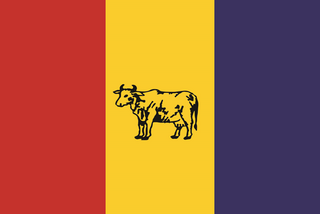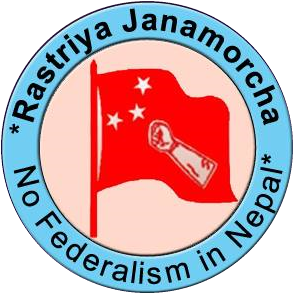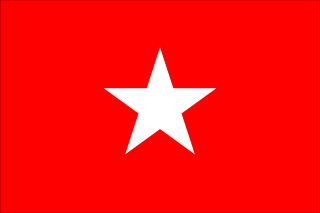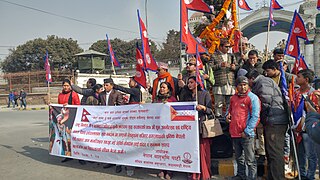
Kangchenjunga, also spelled Kanchenjunga, Kanchanjanghā and Khangchendzonga, is the third-highest mountain in the world. Its summit lies at 8,586 m (28,169 ft) in a section of the Himalayas, the Kangchenjunga Himal, which is bounded in the west by the Tamur River, in the north by the Lhonak River and Jongsang La, and in the east by the Teesta River. It lies in the border region between Koshi Province of Nepal and Sikkim state of India, with the two peaks West and Kangbachen in Nepal's Taplejung District and the other three peaks Main, Central and South directly on the border.

Nepal, officially the Federal Democratic Republic of Nepal, is a landlocked country in South Asia. It is mainly situated in the Himalayas, but also includes parts of the Indo-Gangetic Plain. It borders the Tibet Autonomous Region of China to the north, and India to the south, east, and west, while it is narrowly separated from Bangladesh by the Siliguri Corridor, and from Bhutan by the Indian state of Sikkim. Nepal has a diverse geography, including fertile plains, subalpine forested hills, and eight of the world's ten tallest mountains, including Mount Everest, the highest point on Earth. Kathmandu is the nation's capital and the largest city. Nepal is a multi-ethnic, multi-lingual, multi-religious, and multi-cultural state, with Nepali as the official language.

The Rastriya Prajatantra Party is a constitutional monarchist and Hindu nationalist political party in Nepal.

The Terai or Tarai is a lowland region in parts of southern Nepal and northern India that lies to the south of the outer foothills of the Himalayas, the Sivalik Hills and north of the Indo-Gangetic Plain. This lowland belt is characterised by tall grasslands, scrub savannah, sal forests and clay rich swamps. In North India, the Terai spreads from the Yamuna River eastward across Haryana, Uttarakhand, Uttar Pradesh, Bihar and West Bengal. The Terai is part of the Terai-Duar savanna and grasslands ecoregion. Nepal's Terai stretches over 33,998.8 km2 (13,127.0 sq mi), about 23.1% of Nepal's land area, and lies at an elevation of between 67 and 300 m. The region comprises more than 50 wetlands. North of the Terai rises the Bhabar, a narrow but continuous belt of forest about 8–12 km (5.0–7.5 mi) wide.

Nepal Ratna Man Padavi Madan Kumar Bhandari, commonly known as Madan Bhandari, was a popular Nepali political leader belonging to the Communist Party of Nepal, a democratic communist party in Nepal. He defeated the incumbent Prime Minister Krishna Prasad Bhattarai in a landslide victory in the 1991 general election. Known for his charismatic style, Bhandari propounded the popular communist principle or thought "People's Multiparty Democracy". He is widely regarded for peaking the Nepal's communist movement to a greater height. He died in a jeep accident in Dasdhunga, Chitwan, in 1993.

The Himalayan subtropical pine forests are a large subtropical coniferous forest ecoregion covering portions of Bhutan, India, Nepal, and Pakistan.

The Himalayan subtropical broadleaf forests is an ecoregion that extends from the middle hills of central Nepal through Darjeeling into Bhutan and also into the Indian States of Uttar Pradesh and Bihar. It represents the east–west-directed band of subtropical broadleaf forest at an altitude of between 500 and 1,000 m along the Outer Himalayan Range, and includes several forest types traversing an east to west moisture gradient.

The Nepal Communist Party, abbreviated NCP is a defunct communist party which existed in Nepal from 2018 to 2021. It was founded on 17 May 2018, from the unification of two leftist parties, Communist Party of Nepal and Communist Party of Nepal. The unification was completed by the Party Unification Coordination Committee, after eight months of negotiation. The two predecessor parties subsequently dissolved, making way for the new united party. The party retained the electoral symbol of the CPN (UML), the sun.

Rastriya Janamorcha is a political party in Nepal. It was originally founded in 1995 as the legal front of Communist Party of Nepal (Masal). Former Deputy Prime Minister, Chitra Bahdur KC is the chairman of the party.

The Communist Party of Nepal Marxist−Leninist (Samajbadi) was a political party in Nepal. The party was founded on August 6, 2010, through a split in the Communist Party of Nepal (Marxist-Leninist).

The Nepal Sadbhavana Party was a political party in Nepal that worked for rights of the Madhesi people and discriminated communities and groups of Nepal.

Khadga Prasad Sharma Oli, commonly known as K. P. Sharma Oli or simply K.P. Oli, is a Nepalese politician who is serving as the prime minister of Nepal since 15 July 2024.

The Central Zoo is a 6-hectare (15-acre) zoo in Jawalakhel, Nepal. It is home to some 969 animals in 109 species, and is operated by the National Trust for Nature Conservation (NTNC). Although it was originally a private zoo, it was opened to the public in 1956.

The Federal Socialist Forum, Nepal was a democratic socialist political party in Nepal. The party came into being on 15 June 2015 with the merger of the Madhesi Jana Adhikar Forum, Nepal, the Federal Socialist Party Nepal and the Khas Samabeshi Party. On 6 May 2019, the party merged with Naya Shakti Party, Nepal to form Samajbadi Party, Nepal.

Nepal Federal Socialist Party is a political party in Nepal. The party was formed on 17 December 2016 by Mohammad Rizwan Ansari.

Communism in Nepal traces its roots back to the pro-democracy movement of 1951, and the subsequent overthrow of the autocratic Rana regime and the establishment of democracy in Nepal. The communist movement in Nepal has split into factions multiple times and multiple factions have come together into a single fold at times as well. It has a history of getting banned from open political discourse, as well as multiple instances of embracing guerrilla insurgency, most notably, the Maoist insurgency in the 1990s and early 2000s that led to the Nepalese Civil War, claiming at least 17,000 lives.

The People's Socialist Party, Nepal, also known as Janata Samajbadi Party Nepal is the eighth largest political party in Nepal. Since the 2022 local election, the party has been limited to stand only as the third largest party of Madhesh Province after the Nepali Congress and CPN (UML) respectively.

Prithvi Jayanti (Nepali: पृथ्वी जयन्ती, lit. 'Birthday of Prithvi Narayan Shah'; also known as the Nepal Ekikaran Diwas is an observance annually celebrated on 11 January to commemorate the birth of King Prithvi Narayan Shah, who was the first king of unified Nepal. In the mid-18th century, he set out to unify the small kingdoms which would become present-day Nepal. During the observance, many people add a garland to statues of Shah, participate in the parades, and remember his contribution to Nepal. Prithvi Jayanti was celebrated as a public holiday from 1951 until its abolishment in 2006. However, some local governments in Gorkha District and Nuwakot District have declared Prithvi Jayanti to be a public holiday. In 2023, the government declared it as a national holiday.

The Madhesi Jana Adhikar Forum, Nepal (Loktantrik) was a political party in Nepal. It existed as one of the important political force during the constituent assembly. Later the party merged with several other parties to become the largest Madhesh/Tharuhath based party, Nepal Loktantrik Forum.

















